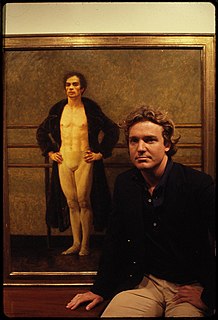A Quote by Ivy Compton-Burnett
The plot is not very important to me, though a novel must have one, of course. It's just a line to hang the washing on.
Related Quotes
What must novel dialogue . . . really be and do? It must be pointed, intentional, relevant. It must crystallize situation. It must express character. It must advance plot. During dialogue, the characters confront one another. The confrontation is in itself an occasion. Each one of these occasions, throughout the novel, is unique.
If someone does learn about the world from reading a novel of mine, that makes me very happy. It's probably not what brings me into the novel in the first place - I usually am pulled in by some big question about the world and human nature that I'm not going to resolve in the course of the novel. But I'm very devoted to getting my facts straight.
It's disingenous for me to say that I wasn't trying to write a moral novel. By its very nature as a novel about the Iraq War, Fobbit steps into the political conversation. There's no way to avoid that. I can appreciate that readers are probably going to line up on one side of the novel or the other. I hope they go to those polar extremes, actually.
The Pixar people continuously amaze me. They come up with something that actually looks as though it takes place in this happy, real-world. Every plot line is not just plausible, but oddly authentic. The stories are full of adventure, humor and love. The characters are written with great human dimension. I don't know how they do it but they astound me.
Everything in art depends on execution: the story of a louse can be as beautiful as the story of Alexander. You must write according to your feelings, be sure those feelings are true, and let everything else go hang. When a line is good it ceases to belong to any school. A line of prose must be as immutable as a line of poetry.
I always write a draft version of the novel in which I try to develop, not the story, not the plot, but the possibilities of the plot. I write without thinking much, trying to overcome all kinds of self-criticism, without stopping, without giving any consideration to the style or structure of the novel, only putting down on paper everything that can be used as raw material, very crude material for later development in the story.
Just supposing," he said, "just supposing" --he didn't know what was coming next, so he thought he'd just sit back and listen--"that there was some extraordinary way in which you were very important to me, and that, though you didn't know it, I was very important to you, but it all went for nothing because we only had five miles and I was a stupid idiot at knowing how to say something very important to someone I've only just met and not crash into lorries a the same time, what would you say..." He paused, helplessly, and looked at her. "I should do.






































